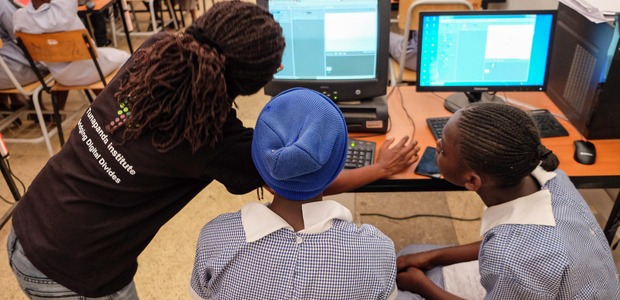advertisement
Kenyan Women in Tech Initiative selected to showcase innovation at MIT Cambridge campus
This is a competition showcasing the talent of students and young innovators who are using science, technology, innovation and partnerships…

This is a competition showcasing the talent of students and young innovators who are using science, technology, innovation and partnerships to tackle global challenges. The Innovation Marketplace, supported by USAID, will take place on MIT’s Cambridge campus as a feature of Higher Education Solutions Network (HESN) TechCon 2016.
Sub-Saharan Africa is poised for major population growth, and our school systems are not well enough equipped to handle the increase in student population. By 2050, an estimated 40% of the world’s children will be in Africa, and the population of our continent is set to increase from 1.2 billion today to over 4 billion people by 2100.
While the educational opportunities will be insufficient for all children, the situation is especially dire for girls. About 28 million girls aged between 6 and 15 years are currently out of school and may never enter a classroom to learn. The education and opportunities that are available (or not available) to today’s girls will have a profound impact not just in local communities – but on the entire world. What is needed is innovative, low-cost, scalable solutions that reimagine the learning experience for Africa in a digital world.
advertisement
Tech Dada is an initiative that seeks to equip girls and young women with mindsets and skills that will enable them to confidently pursue 21st-century opportunities. Its vision is to ensure more young women in East Africa pursue careers in technology, design, and business with a focus on solving real problems in local communities and globally.
Tech Dada has created a curriculum and courses that increase awareness of tech opportunities for women and try to overturn the gender stereotypes that prevent young women from entering the field of technology.
They achieve these goals through Tech Dada’s community outreach program which engages with local organizations and institutions, such as schools and nonprofit organizations. The outreach aims to demonstrate to girls and young women that women can and do have successful careers in tech, and that learning about technology is essential for success in the 21st century world.
advertisement
The comprehensive curriculum ensures that the girls and young women not only get technical skills but also soft skills such as goal setting and self-confidence. In the past year, Tech Dada has held workshops and provided training and workshops for over 430 girls and young women in rural and urban communities of Kenya.
Beneficiaries of the program report encouraging results from even a few short sessions. The girls are more confident speaking in front of a group, more articulate in sharing their ideas, more interested in technology and more aware of the challenges facing women in the industry, as well as the tools they can use to overcome those challenges.
Tech Dada programs have the potential to reach many more young women in a wide variety of communities, but must first overcome some challenges of its own, including: the shortage of qualified ICT trainers, unaffordable internet costs, and functional computers. To address these challenges, Tech dada is developing a gamified learning platform called Swag.
advertisement
Swag is an open source software system – web and Android – that enables individuals and groups to learn without highly-trained teachers and can be deployed in low/no internet situations. The curriculum is based on Tunapanda’s successful 3-month course in Kibera, Nairobi.
A prototype of the software can be seen at http://learning.tunapanda.org. The curricula will focus on demystifying and contextualizing tech and provide instruction in how users can be able to use technology to create solutions for local challenges. Upon completion of any course, girls and young women will earn skill-based badges and a course certificate which can help them get jobs in the digital economy.
In addition to helping girls and young women develop the skills they need, Swag will also help young women and girls feel more comfortable in tech. We will partner with local cyber cafes, libraries, society organisations and schools to install the software on their computers.
Local cyber owners, teachers, and library attendants will be trained on Swag so they can help students and they will be encouraged to set up “girls spaces”, either physically or through special “girls hour” times to reduce sexual harassment (which many young women report as being a main reason they don’t utilize cyber cafes).
Tech Dada plans to expand operations to provide more workshops and engage with more communities in the coming years, and also wants to continue developing innovative solutions to the very important issues of gender inequality in IT.